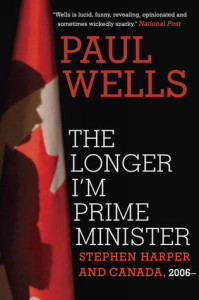 Title: The Longer I’m Prime Minister: Stephen Harper and Canada, 2006 —
Title: The Longer I’m Prime Minister: Stephen Harper and Canada, 2006 —
Author: Paul Wells
Publisher: Random House Canada
Format: Print
Rating: 5 out of 5
How I got it: I borrowed it from the library
Hoo boy….I’m about to get into politics on this blog. More importantly, Canadian politics, which rarely gets as flashy and reality-TV-like as its neighbour to the south. But since Canada’s next federal election is happening in less than a month, and since I have significant issues with the policies that (current) PM Stephen Harper has implemented regarding science funding, citizenship, environmental conservation, and more, this seemed like a very timely reading choice.
But before I go any further, a disclaimer:
Any and all political opinions expressed on this blog are my own, except for wherever indicated, such as excerpts from this book. They are not the opinions of any employers or freelance clients I have previously had, currently have, or may have in the future.
There. Now that that’s out of the way, let’s talk about this book.
Stephen Harper is probably the most polarizing Prime Minister Canada has ever had. His administration originally started off on shaky ground after he first led a minority government in 2006 (my god, I was still in university then, and I remember how much one of my roommates cried in dismay when he won). However, he’s proven to be far more long-lived than anyone expected.
The Longer I’m Prime Minister is Wells’s attempt to recount the history of Harper’s time in power and look at the tactics has has used to maintain it, as well as the philosophy behind how he governs. More importantly, while I personally find Harper’s political stance very much at odds with my own — I once worked as a census enumerator in 2006, before Harper changed the long-form census, and my parents immigrated to Canada in no small part due to Pierre Trudeau’s open immigration policies — I came away from reading it shaken with a grudging respect for how Harper works.
I don’t like the man or his policies, but as a result of reading this book by Wells — the politics editor for Maclean’s, a major Canadian weekly magazine — I can respect Harper for being a tenacious man who knows how to find the weak spots in his opponents’ armour and lever them wide open with a crowbar.
It also helps that the book itself is compulsively readable, with a luscious vein of snark running throughout. Here’s an excerpt describing one particular incident during Michael Ignatieff’s tumultuous time as Liberal party leader:
After two months of riding the EI [Employment Insurance] hobby horse most days in Question Period, Ignatieff was not particularly au fait with the details of the program’s design. They would not have been able to reach a deal that day even if Harper had felt like it. The prime minister suggested, How about some kind of working group to spend the summer looking at the thing? Ignatieff loved the idea. Yes! A working group! And if it spent the summer working, as a group, there was no way Ignatieff could pull the plug on the government. So the sword of Damocles would remain suspended until September. This was fine with Ignatieff. He kept telling everyone the sword was over Harper’s head, but if Ignatieff looked up, it was pointing down at him.
He had no trouble selling the notion to the Liberal caucus the next morning. Remember that election you’ve been dreading after our rout in the last election only seven months ago? Postponed! Reporters waiting outside the Liberal caucus room heard shouts of joy — from the Conservative caucus room, down the Centre Block hallway. Surely Harper was regaling the troops with tales of conquest? “Appearances can be deceiving,” an MP [Member of Parliament] told me later. In fact Chuck Strahl and some of the other caucus members had put together a barbershop quartet. They’d sung a tune for their colleagues, and brought the house down.
Ignatieff emerged from his own tuneless caucus meeting, backed by a dozen of the most photogenic Liberal MPs. This was a good day, he said. He did not mention that of his four ultimatum items, Harper had ignored three and sent the fourth to committee. “Do I look like I’ve been steamrolled?” he asked rhetorically? Well, yes. Yes, he did.
As of this writing, I’m still not sure how I’m going to vote. But I do feel that The Longer I’m Prime Minister was a great refresher course on the last decade of Canadian politics, and for that I feel it was well worth the read.
